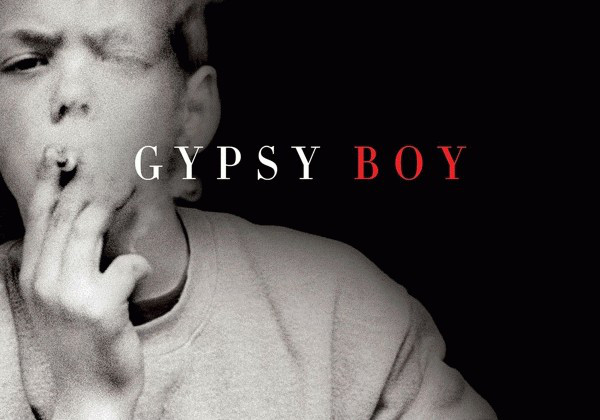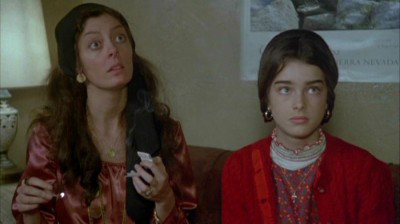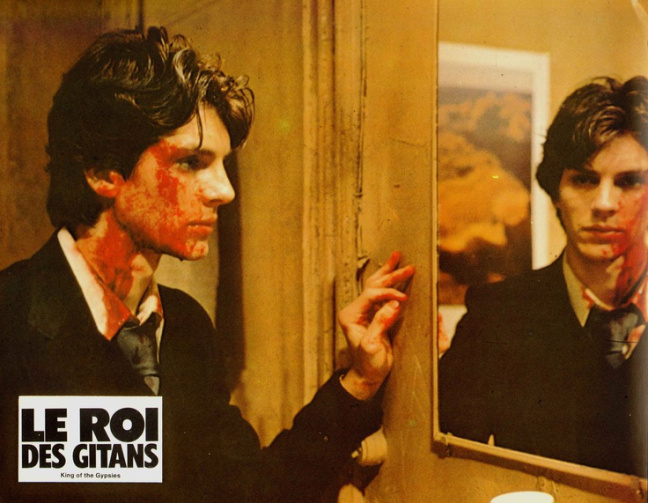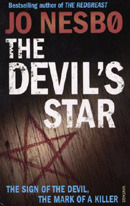
An article recently popped up announcing that the White actor, Benedict Cumberbatch, was due to play Romani author, “Mikey Walsh,” (a pseudonym to “protect” the author from reprisal,) in an adaptation of Walsh’s autobiography, “Gypsy Boy: My Life in the Secret World of the Romany Gypsies.” I observed the distasteful comments under the article, written by various Roma from across the world, which ran in the direction of, “Oh, gee, what a surprise. Yet another Romani role that the movie industry hires non-Roma to play.” Yes, once again, even before shooting has begun, the actual Roma community–the people who are about to be portrayed and, most likely, wind up trashed by stereotypes onscreen–are unhappy. But, as usual, that won’t matter. (When does it ever?)

I could have spent my time writing a “Dr. Mr. Cumberbatch, don’t you have a conscience?” article. I could have pointed out that this is not the day and age when White actors taking the roles of people of color–yes, fyi, Mr. Cumberbatch, that’s what Roma people are–is any longer tolerated. I could note that, back in the 1950s or so, perhaps, as an actor, you could say that everybody does this, which makes it okay. But only a few weeks ago, there was plenty of press when a Jewish actor, Ed Skrein, pulled out of a major role when he realized that the character was Japanese. If Skrein can forego a potential advance in his career, citing ethical reasons, what excuse do you have, Cumberbatch, to be playing a Rom?
In a word: YOU DON’T.
Non-Roma actors playing Roma roles does hurt the Romani community because, contrary to what casting directors out there might like to portray, there are a lot of talented Roma that can act. And these people, because of crap like this, never get the opportunity.
Thus could my rant continue, but then I sat back and realized that, years earlier, I had heard of the book which was just about to be filmed and had refused to buy it on moral grounds. I noted that there were perhaps much bigger issues here than another racially-entitled twit taking one of our roles. The question which popped into my mind was, “Why was this movie being made at all?”
The answer: because the author had capitalized on one of the most pervasive and stellar Gadje (non-Romani) fantasies out there. And it was this fantasy that had helped catapult his book to best-seller status. The fantasy of White people suddenly being able to have an inside look into the “secret world of Gypsies.” I swear to G-d, when you watch every single “Gypsy” reality show, nearly every film made about us, (yet again, very few of which have actual Roma in them and all of whom are definitely not made with a Romani audience as viewers in mind,) it’s like you’re staring at the proverbial “Indian in the Cupboard.” The White person receives a magical key, puts a plastic “Gypsy” into the box, twists the lock, and gets to watch the little minority person dance a cultural jig when they come out on the other side. The spectator says, “Oooh, ahh, isn’t that quaint and interesting? But thank G-d, that’s not my life and my people are better than this!”
Sorry to pop your balloon, happy viewers, but this “insight” which you think that you are gaining does not exist. Actual Roma people are plenty aware of this, just as we are aware that, periodically, one of our own likes to capitalize on your ignorance by making money from the stereotypes against their own kind.
As I said, I haven’t read Mikey Walsh’s book. I don’t intend to. And it’s difficult to review a book that you haven’t read…unless that book has certain general traits which can bring about harm to you and yours on a personal level. Being Romani myself, Walsh’s book impacts me personally, because the things he claims in it, I will have to live with and be judged by, as will all the other Roma that I will ever encounter.
Had his book been presented in an even half-way non-racist and credible fashion, I would have bought it, but the marketing which catapulted his autobiography to fame was, backwards and forwards, an ethnic smear campaign. Did he foresee this would happen? Of course, he did. Anyone from the Romani community with the slightest degree of common sense would have. Did he do anything to calm down the fire of growing racism which he had started? To the contrary, he fanned those flames. While making money for it.
Just what is his subtitle “My Life in the Secret World of the Romany Gypsies” supposed to signify?
What response would fellow Roma have to the amazon description of his book?
“An Eye-Opening Memoir of Growing Up Gypsy
Mikey Walsh was born into a Romany Gypsy family. They live in a secluded community, and little is known about their way of life. After centuries of persecution, Gypsies are wary of outsiders, and if you choose to leave you can never come back.
This is something Mikey knows only too well.
Growing up, he didn’t go to school, he seldom mixed with non-Gypsies, and the caravan became his world. It was a rich and unusual upbringing, but although Mikey inherited a vibrant and loyal culture his family’s legacy was bittersweet, with a hidden history of violence and grief. Eventually Mikey was forced to make an agonizing decision—to stay and keep secrets, or escape and find somewhere to belong.
Gypsy Boy shows, for the first time, what life is really like among the Romany Gypsies. A surprise #1 bestseller in Great Britain, this is a one-of-a-kind memoir of a little-seen world, one both fascinating and heartbreaking.”
Well, there you have it. Walsh is the authority. And his experience will speak for the rest of us…right?
An opening criticism to Walsh or any other individual who claims to have the magic window for Whites into Romani culture…one of the reasons that this is patently impossible is because Romani culture is, point of fact, Romani cultureS. Yes, plural. Ours is very much, for lack of a better term, a tribal system; has been ever since our ancestors, who came from many different backgrounds in India, left our original homeland. And, while there are the more populous tribes at the top, there are plenty of smaller ones. As we are a world-wide diaspora, each tribe has its own specific history, linguistic dialect, mannerisms, and even clothing trends. And what works for UK Romanies, despite them getting much more publicity than many of these other tribes because they live in an English-speaking country, does not necessarily, and, in many cases, not at all, work for Roma in other countries.
For example: Walsh portrays the caravan lifestyle, which is very popular in literature, but extremely few Roma, percentage-wise, actually live this way. Many Romani families have gone several centuries since anyone in their family did this. Sorry, I know that doesn’t sound “romantic” or “free-spirited,” but it’s a stone-cold fact.
To put the stupidity of Romani cultural generalization in an American perspective: you might as well film something on the secret world of Native Americans, presenting in the film/ book/ other media, that there’s no cultural difference between the Navajos and the Cherokee, between the Lakota and the Inuit; et cetera.
Another criticism to Walsh, who underwent severe physical abuse in his family, and then wound up basically protesting that this is just the Romani way; that it’s not abuse, but a cultural difference? HOW DARE YOU! I would have compassion for what you went through, if you were not helping to ensure that other Romani children in abusive situations do not receive aid, but by claiming that this is a “cultural difference” that’s exactly what you are doing.
Worldwide, Roma parents face massive discrimination from the day their children are born. The quality of their parenting doesn’t factor in whatsoever. If a child is being beaten, for certain, it should be removed from the custody of the one doing it and the perpetrator should be jailed. Now, if you take a routine reader, who has never met an actual Romani person, and here, in print is a Romani person telling a story about grotesque child abuse, but then justifying it as a cultural difference, you’re going to have two things happen:
- Gadje will feel that the automatic removal of Romani children from their families is thoroughly justified in order to spare said children from a life of physical abuse. This attitude will result in bigotry directed against mainstream Roma who do not abuse their children. Those families will be harassed, by neighbors and by government agencies. Those families will have to worry about said agencies trying to remove their children purely on racial grounds.
- When Romani children are in abusive households, if they try to obtain help from authorities, like their teachers or the police, some authorities will refuse to help them, stating that the abuse is simply a cultural norm. In other words, the authority will care more about preserving their public image as politically correct and “not interfering” than doing their actual job and keeping the child safe.
Certain things violate human rights. We all understand this on a basic, instinctive level. You don’t have to be White or Romani to know that a father beating his son with a shovel, as portrayed in Walsh’s book, is a criminal action which must be prosecuted. You don’t need to be Romani or White to know that beating one’s wife unconscious, again, portrayed in Walsh’s book, is a criminal action which must be prosecuted.
There is no excuse for it.
There is no “culture difference” which makes it, or things like it, okay.
It’s actually infuriating, to my mind, pathetic, that a Romani woman has to use her status of being Romani to say, “Yes, indeed, even Romani women and children deserve to not be beaten. Regardless of the aggressor’s ‘justification’ for why, it’s still abuse.” Because any outsider that needs to be told this is still abuse, regardless of my race and cultural background, shouldn’t be reading books written by the likes of Walsh in the first place. That’s the type of person who lacks all ability to see us as equally human, with the same ability to feel pain, as they themselves.
Did violence get a free pass in Walsh’s case? I don’t disbelieve him that it happened. But what does that really mean? Is he unique? No. A lot of instances of domestic violence, sadly, meet with no help. Watch Lifetime TV any day of the week and you’ll find a movie about some poor woman or child whose relatives, neighbors, et cetera, knew about the violence going on and yet refused to do anything. It’s not cultural. It’s a negative human trait which you would find in any town across the world.
I myself am a child domestic violence survivor. Intense violence. But, unlike Walsh, however, I don’t lay this at the feet of the Romani people. I lay this at whose feet it belongs—the guilty parties’. And if I published about that violence, for certain, I would not use my status as Romani to help sell copies. I would not claim in my subtitle that my life was any kind of norm by which other Roma should be judged because, frankly, I know very well that it absolutely is not.
What would I do if I saw a Romani man beating his wife or child? I would call the cops. And that’s, sadly for audiences, the reaction that a great deal of Roma would have. No, not all. But neither would all White people. Your reaction in such an instance depends upon your personal integrity. Would that we were all willing to stick our necks out for others, but this is not the case.
A further criticism for that book: sorry to disappoint White audiences yet again, but, like the stereotype of Romani women all being knife-fighters, not all Romani men are groomed to be bare-knuckle boxers. The sport may be very popular in some areas, but definitely not in all. (Any who doubt this would note that serious bare-knuckle boxing does significant damage to the hands, not to mention your opponent’s teeth. If the stereotype were true, Romani men’s hands would pretty uniformly be torn up and a large percentage of them would have massive dental damage. Unless, that is, Walsh alleges they just aren’t very good at it.) To be honest, I’ve never even seen a single bare-knuckle fight, nor the aftermath of one, in my life. Where I’m from, the boys were told that to truly prove yourself, you had to use your intelligence. I heard proverbs to the tune of how anyone can be strong, but true worth comes from your wits. In my family and in many other Romani families that we associated with, the goal was to work hard in school, get into a university, and be more than the dirt that mainstream society expected us to be.
But books and films about Romani men who wind up with college degrees, or, as some of the men in my family did, as actual college professors, don’t sell. To the contrary, whenever such people are portrayed, it is always as though they have betrayed their culture, “turned White,” and no longer can be acknowledged as Romani at all. In other words, just like those ancestors of ours who were slaves, we are good enough to show our worth through physical exertion, particularly if Gadje ever get to be entertained by it, but must remember our place as having inferior capabilities when it comes to our brains.
Several decades ago, a film came out, portraying nomadic Roma in America. Child abuse, domestic violence, and other crimes were rampant. Education was non-existent. As one Romani woman later told me, “That movie made me hate my own people.” And yet White Americans loved it. It starred Eric Roberts, Susan Sarandon, Brooke Shields, and numerous other non-Roma actors.

(Above, Sarandon and Shields portraying Romani-Americans. As usual, a headscarf, peasant blouse, and hoop earrings are all you need for White actors to become People of Color onscreen.)
I once spoke to a cousin of the family portrayed in said film, “The King of the Gypsies,” and she related how, decades later, they still live with its stigma, its lies, and how they know that it brought damage to the community as a whole. I felt sorry for her, particularly as I knew that, when the book and later film were put out, it was hailed as the window into our secret, forbidden world.
If the portrayal in it was accurate, it would still only represent one family. But that was irrelevant to the masses viewing it in theatres.
Just as, even if everything that Walsh is saying is accurate, the fact that he and his personal experiences do not represent all Romani culture will also be ignored by film-goers.
Perhaps Hollywood needs one of these “Gypsy lives are awful” stories every few years though. “The King of the Gypsies” certainly established there is a market for it. The “Gypsy reality shows,” even though they were wildly inaccurate and typically had Irish Travellers, not Romani people, onscreen, shows that people just can’t get enough these days of hating on us.

(Roberts in “The King of the Gypsies.”)
In closing, I will simply point out one thing to Walsh’s fans about his book’s description’s first paragraph—its reference to cultural shunning. Perhaps it would be wise for Walsh to note that, when you take it upon yourself to trash and blame your own people as a general whole for your own personal traumas, you shouldn’t be all that shocked when they don’t want to be around you afterwards. Or when they won’t support your stereotype-loving memoir that absolutely gets its life force from the fact that non-Roma racists are looking to justify their negative beliefs about us. What you call a cultural trait, others would simply call the golden rule. Or karma.
Advertisements Share this:





